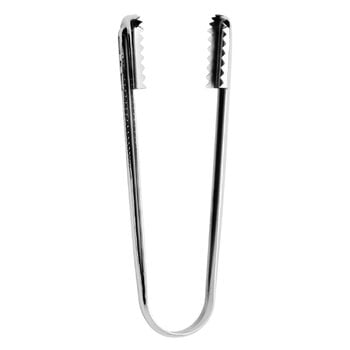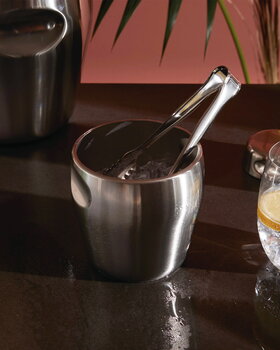Alessi's tongs make adding ice to drinks easy and convenient – no more picking up ice cubes with frozen fingers! Designed by Ettore Sottsass, the mirror-like shine of the stainless steel brings a luxurious feel to both home and professional kitchens, for everyday use and memorable moments as well. These ice tongs are so stylish that between use you can leave them hanging visible, waiting for the next occasion.
Ice tongs, stainless steel
Alessi
Description
Alessi's tongs make adding ice to drinks easy and convenient – no more picking up ice cubes with frozen fingers! Designed by Ettore Sottsass, the mirror-like shine of the stainless steel brings a luxurious feel to both home and professional kitchens, for everyday use and memorable moments as well. These ice tongs are so stylish that between use you can leave them hanging visible, waiting for the next occasion.
Product details (4)
- Material
- 18/10 stainless steel
- Colour
- Steel
- Length
- 8.46 in (21.5 cm)
- Care instructions
- Dishwasher safer. Do not use abrasive cloths or detergents that may damage the surface.
- Product ID
Designer
Ettore Sottsass (1917–2007) was an influential Italian designer and architect, who became famous for his colorful, modernist designs and experimental, radical attitude. He was one of the founders of the design group Memphis, and in 1980 he founded his own agency Sottsass Associati, which today has offices in London and Milan. Sottsass designed many products for the Italian design brand Alessi, and his works are included in the Alessi 100 Values Collection, which was launched to celebrate Alessi's centennial.
View all productsReviews (1)
1
Based on 1 reviews
-
A
Anonymous
United States
Unfortunately they look very cheap. I got them to go with a gorgeous modern lucite ice bucket -as a wedding present- and would never give these tongs as a present- Very disappointed. Most Scandinavian products are great design and quality. These seem like $10 tongs.
429 days ago
Sustainability
The Product Sustainability Framework, our criteria of sustainable design, helps you find the most sustainable products in our selection. Read below which sustainability criteria this product has met.
Working conditions & labour 8/9
-
Equal opportunities for all employees
-
Commitment to UN Global Compact, fair compensation for all employees
-
Corporate responsibility requirements defined and communicated for suppliers
-
Systematic work for improved inclusion and well-being in the workplace
-
Transparent supply chain
-
Suppliers' compliance to a code of conduct ensured
-
Direct suppliers audited and certified
-
Compliance to the UN Guiding Principles on Business and Human Rights ensured in the supply chain
-
Support for community involvement in the supply chain
Eco-friendly production 8/9
-
Fair and resource-wise water-use in production
-
No incineration or landfilling of returned items
-
No use of endangered species as materials
-
No direct environmental emissions or waste (excl. GHGs) from production
-
The sustainability of direct suppliers' production is addressed and monitored
-
Production and material sourcing that respect biodiversity, animal rights, and natural ecosystems
-
Material-efficient and ecological packaging
-
No potentially harmful chemicals used in own production
-
Positive impact on nature’s well-being through operations that regenerate natural ecosystems
Climate impact 4/8
-
Company's direct greenhouse gas emissions identified and commitment to reduction
-
Product's carbon impact identified and commitment to reduction
-
Guidance on energy- and eco-efficient use of the product
-
Carbon footprint of the product calculated and goals set to reduce it
-
Contribution to climate initiatives beyond the brand’s direct operations
-
Low-carbon or compensated transportation
-
100 % renewable energy in own production and operations
-
Carbon neutral or carbon negative product
Sustainable materials 5/6
-
Sustainable and long-lasting material choices
-
No harmful or hazardous substances
-
Responsible raw material sourcing and production
-
Materials suited for circularity: monomaterials, recyclable finishings, renewable or recycled contents etc.
-
Ecological materials: natural, biodegradable, recyclable or recycled contents
-
Outstanding materials in terms of innovativeness, responsibility, sustainability and circularity: local production or sourcing, 100 % recycled content, C2C-certification etc.
Circular design 5/5
-
High aesthetic quality promoting long-term use of the product
-
Technically durable product design and material choices
-
Design for enduring life-long quality
-
Design and support for product maintenance, repair and upgradability
-
Innovative circular design solutions: circular service system, resale platform, remanufacturing, collection of used products, etc.











